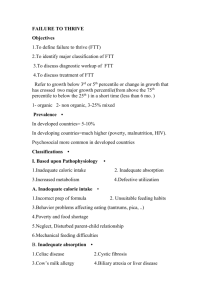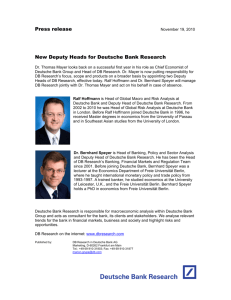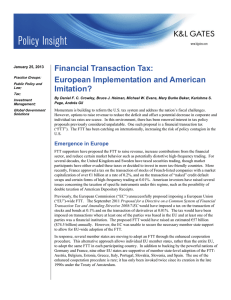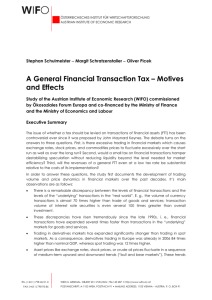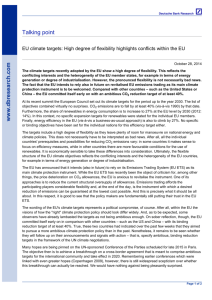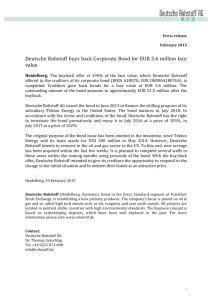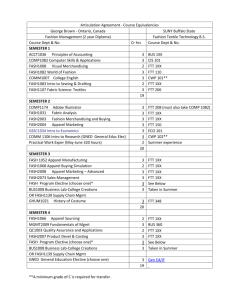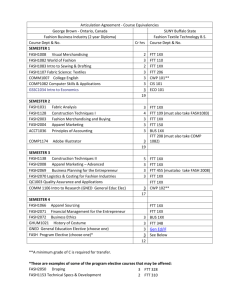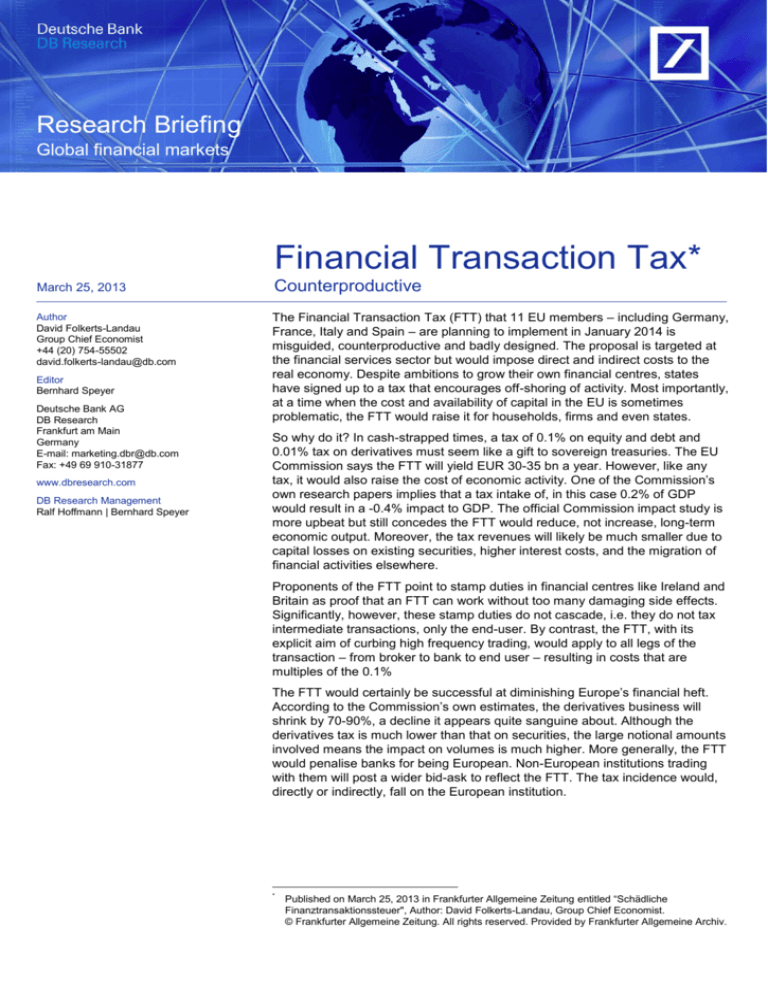
Research Briefing
Global financial markets
Financial Transaction Tax*
March 25, 2013
Counterproductive
Author
David Folkerts-Landau
Group Chief Economist
+44 (20) 754-55502
david.folkerts-landau@db.com
The Financial Transaction Tax (FTT) that 11 EU members – including Germany,
France, Italy and Spain – are planning to implement in January 2014 is
misguided, counterproductive and badly designed. The proposal is targeted at
the financial services sector but would impose direct and indirect costs to the
real economy. Despite ambitions to grow their own financial centres, states
have signed up to a tax that encourages off-shoring of activity. Most importantly,
at a time when the cost and availability of capital in the EU is sometimes
problematic, the FTT would raise it for households, firms and even states.
Editor
Bernhard Speyer
Deutsche Bank AG
DB Research
Frankfurt am Main
Germany
E-mail: marketing.dbr@db.com
Fax: +49 69 910-31877
www.dbresearch.com
DB Research Management
Ralf Hoffmann | Bernhard Speyer
So why do it? In cash-strapped times, a tax of 0.1% on equity and debt and
0.01% tax on derivatives must seem like a gift to sovereign treasuries. The EU
Commission says the FTT will yield EUR 30-35 bn a year. However, like any
tax, it would also raise the cost of economic activity. One of the Commission’s
own research papers implies that a tax intake of, in this case 0.2% of GDP
would result in a -0.4% impact to GDP. The official Commission impact study is
more upbeat but still concedes the FTT would reduce, not increase, long-term
economic output. Moreover, the tax revenues will likely be much smaller due to
capital losses on existing securities, higher interest costs, and the migration of
financial activities elsewhere.
Proponents of the FTT point to stamp duties in financial centres like Ireland and
Britain as proof that an FTT can work without too many damaging side effects.
Significantly, however, these stamp duties do not cascade, i.e. they do not tax
intermediate transactions, only the end-user. By contrast, the FTT, with its
explicit aim of curbing high frequency trading, would apply to all legs of the
transaction – from broker to bank to end user – resulting in costs that are
multiples of the 0.1%
The FTT would certainly be successful at diminishing Europe’s financial heft.
According to the Commission’s own estimates, the derivatives business will
shrink by 70-90%, a decline it appears quite sanguine about. Although the
derivatives tax is much lower than that on securities, the large notional amounts
involved means the impact on volumes is much higher. More generally, the FTT
would penalise banks for being European. Non-European institutions trading
with them will post a wider bid-ask to reflect the FTT. The tax incidence would,
directly or indirectly, fall on the European institution.
*
Published on March 25, 2013 in Frankfurter Allgemeine Zeitung entitled “Schädliche
Finanztransaktionssteuer", Author: David Folkerts-Landau, Group Chief Economist.
© Frankfurter Allgemeine Zeitung. All rights reserved. Provided by Frankfurter Allgemeine Archiv.
Financial Transaction Tax: Counterproductive
Most importantly, the FTT would hurt the real economy. Corporates account for
about 10% of total FX derivatives turnover in the FTT tax area, mostly for
hedging international trade and interest rates, and Oliver Wyman estimates
transaction costs for them could increase by 300%. The tax would even apply to
secondary transactions of sovereign debt, increasing the yield differential due to
liquidity and therefore the price. For instance, the pre-crisis spread between
German and Austrian sovereign debt, which could reasonably be assigned as a
liquidity premium, was around 10 basis points. Assuming this same liquidity
premium, and given that outstanding EU sovereign debt is EUR 8.5 trillion, EU
sovereigns would eventually have to pay an additional EUR 8.5 bn of interest
due to the FTT. This alone would reduce by a quarter the supposed revenue
gain from the tax.
Finance does need reform, but the FTT is the wrong solution. The rules on
liquidity, capital and derivatives that have been introduced since 2007 and which
are still being implemented, are more sensible. This is a bad law and should be
scrapped.
David Folkerts-Landau, Group Chief Economist
(+44 (20) 754-55502, david.folkerts-landau@db.com)
© Copyright 2013. Deutsche Bank AG, DB Research, 60262 Frankfurt am Main, Germany. All rights reserved. When quoting please cite “Deutsche
Bank Research”.
The above information does not constitute the provision of investment, legal or tax advice. Any views expressed reflect the current views of the author,
which do not necessarily correspond to the opinions of Deutsche Bank AG or its affiliates. Opinions expressed may change without notice. Opinions
expressed may differ from views set out in other documents, including research, published by Deutsche Bank. The above information is provided for
informational purposes only and without any obligation, whether contractual or otherwise. No warranty or representation is made as to the correctness,
completeness and accuracy of the information given or the assessments made.
In Germany this information is approved and/or communicated by Deutsche Bank AG Frankfurt, authorised by Bundesanstalt für Finanzdienstleistungsaufsicht. In the United Kingdom this information is approved and/or communicated by Deutsche Bank AG London, a member of the London Stock
Exchange regulated by the Financial Services Authority for the conduct of investment business in the UK. This information is distributed in Hong Kong
by Deutsche Bank AG, Hong Kong Branch, in Korea by Deutsche Securities Korea Co. and in Singapore by Deutsche Bank AG, Singapore Branch. In
Japan this information is approved and/or distributed by Deutsche Securities Limited, Tokyo Branch. In Australia, retail clients should obtain a copy of a
Product Disclosure Statement (PDS) relating to any financial product referred to in this report and consider the PDS before making any decision about
whether to acquire the product.
Internet/E-mail: ISSN 2193-5963
2
| March 25, 2013
Research Briefing




